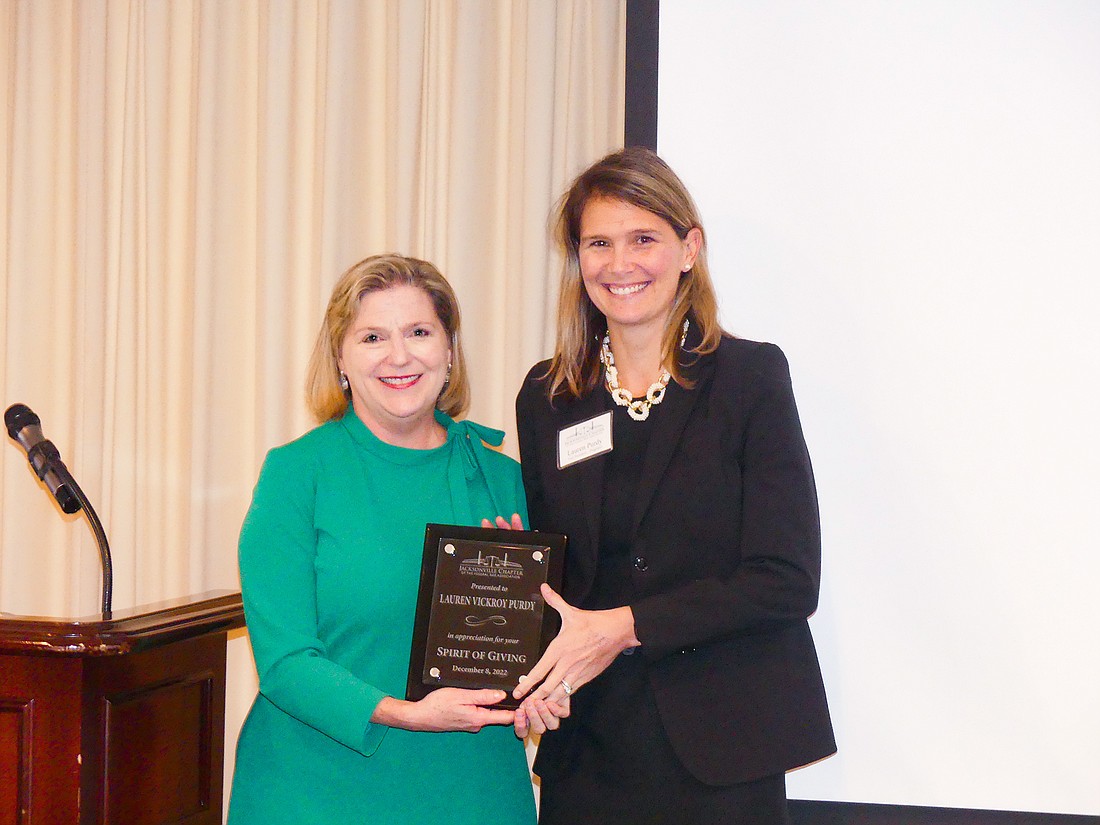
The Federal Bar Association Jacksonville Chapter recognized outstanding members for service to the community at the 16th annual Honorable Harvey E. Schlesinger Spirit of Giving Holiday Luncheon on Dec. 8 at The River Club.
“We honor the season and we honor those who go above and beyond and use their talents as attorneys to do the greater good,” chapter President Laura Renstrom said.
The chapter selects a civil practice litigator and a criminal practice litigator each year to receive the Spirit of Giving Award.
The 2022 civil litigator award was presented to Lauren Purdy, a shareholder at Gunster’s Jacksonville office and a member of the court’s Pro Bono Panel.
Purdy volunteered to represent two clients in the past year – a death row inmate who alleged improper medical care in prison and a convicted sex offender who claimed violation of their First Amendment rights.
Purdy was able to reach a settlement with the government on behalf of the death row inmate and secured the right for the sex offender to have a photo of a minor child relative who was on the inmates approved visitor list, U.S. District Judge Marcia Morales Howard said in presenting the award.
“You do a great service to the court by allowing us to get cases moving quickly,” Howard said of Purdy and her colleagues on the panel.
Chief Judge of the U.S. District Court, Middle District of Florida Timothy Corrigan presented the criminal practice award to the late William “Bill” Sheppard.
Sheppard died April 9 at age 80 after a long illness, ending his career that spanned more than 50 years.
“He specialized in the downtrodden, forgotten and marginalized. He took on unpopular cases. Bill’s advocacy led to significant improvements in conditions for inmates and his was the first racially integrated law firm in Florida. He was one of the most respected and able practitioners to appear before me,” Corrigan said.
State Attorney for the 4th Judicial Circuit Melissa Nelson, the keynote speaker, talked about justice and conviction integrity.
“Justice can be different things depending on different factors,” Nelson said.
“But, regardless of the underlying circumstances and whether justice in one case is about freedom, and in another, about punishment, all roads to it should be about truth,” she said.
The search for truth is important for all litigators, Nelson said, but nowhere is it more important than in the criminal courtroom.
“My experience is that those of us who work in the criminal justice system — law enforcement, prosecutors, defense counsel, trial and appellate judges — work hard to get it right. Our system is structured so that backstops exist to catch mistakes. But the unfortunate truth is that every now and then the system can still fail,” Nelson said.
That knowledge led her office to establish a Conviction Integrity Review initiative in 2018, Nelson said.
“In our office, if the CIR accepts a petition for review, they approach the case through a different lens. Not through a bent ‘oh he must be innocent’ view but with an open mind. In the space in which they work, there is more room for a nonadversarial approach to assessing evidence and they often work collaboratively with the petitioner and his counsel,” she said.
Reviewing guilty verdicts for possible errors that can lead to reversal of a conviction has its implications, but the effort to seek justice in all cases has its rewards, Nelson said.
“I concede that exonerations, and publicity around exonerations, may make seeking a conviction tougher. But our community exacting high standards on the system and system actors does not mitigate our obligation to pursue justice. I also believe that our willingness to audit our work, own our mistakes and use them for the sake of good should build trust in the system.”
Closing her remarks, Nelson cited Sheppard’s legacy to fairness in the justice system.
“Historically, it has been individual warriors, like Bill, who fought to achieve justice in the context of injustice. But the responsibility of justice does not rest solely on the shoulders of solitary champions. The system is charged with ensuring justice and we all share in this responsibility because one wrongfully convicted person impacts all free people,” Nelson said.